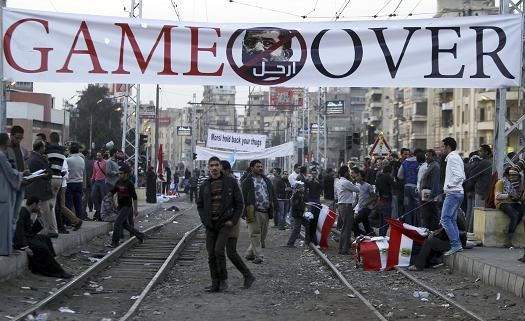Outside Egypt, Referendum Voting Begins, As Protests Continue To Swirl In Country

Twenty-thousand expatriate Egyptians participated in the first day of voting on the draft constitution, the Egyptian Foreign Ministry announced on Thursday.
The official numbers released in a foreign ministry statement showed that of the 586,000 estimated Egyptians living abroad, 5,832 voters cast ballots in Kuwait, 3,881 in Riyadh, Saudi Arabia, and 3,335 cast ballots in Jeddah, Saudi Arabia. On the whole, 128 Egyptian embassies and consulates worldwide have participated so far.
One of the opposition parties led by former presidential candidate Mohamed El-Baradei released a statement on Thursday claiming "irregularities and violations" during voting in France, Kuwait and Saudi Arabia. One man said when he arrived at his polling place, there was a mark next to his name indicating he had already voted, and the party claimed that the Muslim Brotherhood was distributing leaflets with the logo of the Egyptian Embassy in Saudi Arabia, encouraging people to vote yes.
An assistant foreign minister, Ali al-
“The voting process is going smoothly. No embassies have notified the Foreign Ministry of any problems so far,” Eshairy said. “Work has been regular in all 128 embassies and 11 consulates since Wednesday morning.”
Referendum voting will continue for expatriates until Saturday. Voting will take place over two days, Saturday and Dec. 22, in Egypt, however electoral committees are scheduled to begin counting votes as of 8 p.m. Saturday, Al Masry Al-Youm reported.
The referendum is going ahead despite a refusal by a large number of Egyptian judges and diplomats abroad to supervise the vote, including the Egyptian ambassadors to Australia, Finland, Spain and Sri Lanka, Al-Masry Al-Youm said. Earlier in the week, the Muslim Brotherhood-led government announced that, despite the strike, there were enough judges to oversee the referendum.
On Thursday, the head of the Coptic Christian Church, Pope Tawdros II, encouraged his followers to "go and vote" but did not stress whether Copts should vote yes or no, the state-run news agency Al-Ahram reported. Egyptian Copts make up the largest Christian community in the Middle East and are one of Egypt's most oppressed minorities.
Opposition parties campaigning against the proposed constitution say that the Egyptian Assembly is too heavily dominated by the Muslim Brotherhood and Islamists loyal to them, and, as a result, the draft constitution does not reflect the needs and rights of all Egyptians.
On Thursday, a Muslim Brotherhood spokesman took an opportunity to slam the opposition, telling Al-Masry Al-Youm that "the closer we are to the ballot boxes, the closer they are to the Molotov cocktails."
Egyptian President Mohammed Morsi has called for a "national dialogue" between the parties, ostensibly to touch on the concerns the opposition has, Al-Ahram reported. The talks were to resume on Thursday afternoon local time with a meeting between Morsi and a "committee of experts" to discuss redrafting the more contentious articles of the constitution, which include those relating to women's rights and religious freedom. Much of the opposition, Al-Ahram said, have refused to attend these meetings.
The deep fragmentation and disjointed messages of the National Salvation Front, the opposition's umbrella group, have greatly hindered their efforts to stop the referendum vote from going ahead. On Thursday, both sides announced they would be holding more protests on Friday, the day before in-country voting is scheduled to begin. A spokesman for the 6 April Movement, Ahmed Said, one of the opposition parties, told Reuters there will likely be more violence.
"During the referendum, I believe there will be blood and a lot of antagonism, so it is not right to hold a referendum," Said said.
© Copyright IBTimes 2025. All rights reserved.






















